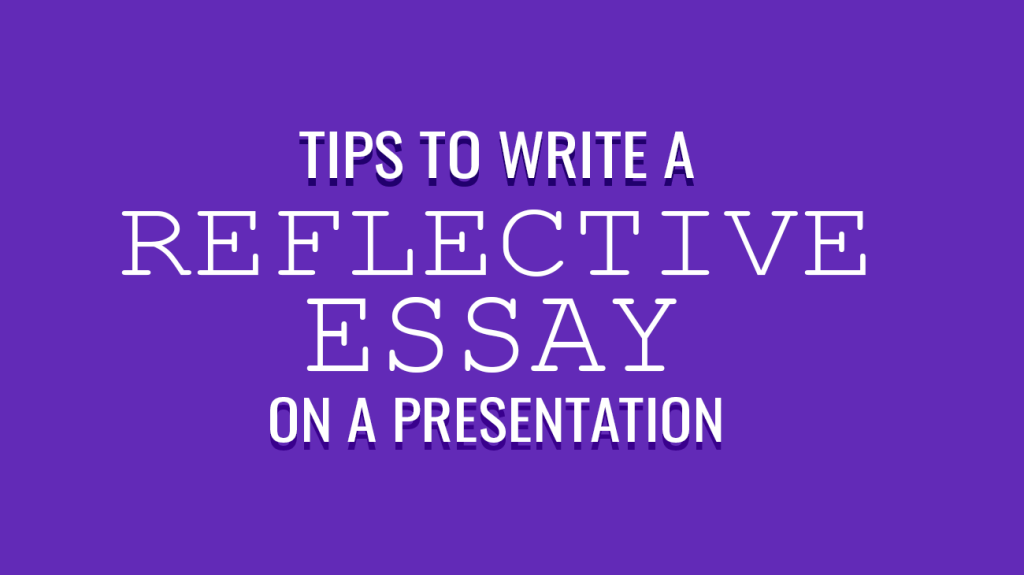
Reflective writing is an important skill that helps people think about their experiences and share their thoughts and feelings about something special. When we reflect on a presentation, like a group project, a lecture, or a talk we gave, it’s essential to know how to write a great reflective essay.
Here we will provide helpful tips and guidelines to assist you in writing an effective and meaningful reflective essay on a presentation. By following these suggestions, you’ll be able to express your thoughts and reflections in a clear and powerful way. Let’s explore the key aspects of writing a perfect reflective paper on a presentation.
Reflective Writing on Presentation – Key Steps and Ideas
Reflective writing on presentation involves looking closely at the experience of the presentation and analyzing how it has influenced your learning and personal growth. Here are some helpful tips to assist you throughout the reflective writing process:
- Understand the purpose: Before you begin writing your reflective essay, take some time to comprehend the purpose of the presentation and the goals you aimed to achieve. Consider who the intended audience was, what the topic was, and the objectives set for the presentation.
- Recall the presentation: Take a moment to reflect on the presentation itself. Think about the content, structure, and delivery of the presentation. Consider its strengths and weaknesses, the challenges you encountered, and the overall effectiveness of the presentation.
- Identify key learnings: Reflect on what you have learned from the presentation. Did it help you gain a better understanding of the topic? Did it challenge your existing knowledge or beliefs? Identify the significant insights or new perspectives you gained through the presentation.
- Analyze your performance: Evaluate your own performance as a presenter or group member. Assess your presentation skills, such as how well you communicated, organized, and engaged with the audience. Reflect on the aspects that went well and areas where you could improve.
- Connect personal experiences: Relate the presentation to your own experiences, knowledge, or values. Did the topic resonate with you on a personal level? How did it connect to your life or previous experiences? Reflect on the significance of these connections and how they influenced your understanding or perspective.
- Consider different perspectives: Think about different viewpoints or opinions that were presented during the presentation. Did it challenge your own beliefs or expose you to alternative perspectives? Reflect on how these differing viewpoints affected your thinking and whether they prompted any changes in your own perspective.
- Reflect on the presentation’s impact: Consider the overall impact of the presentation on your learning and personal growth. Did it broaden your knowledge, sharpen specific skills, or inspire you in any way? Reflect on the lasting effects the presentation had on you and how it may influence your future endeavors.
- Use examples and evidence: Support your reflections with specific examples and evidence from the presentation. This could include famous or motivational quotes, anecdotes, or references to specific moments or visuals. Using concrete examples strengthens your reflective essay and adds depth to your reflections.
- Express emotions and thoughts: Remember that reflective writing allows you to express your emotions and thoughts freely. Don’t shy away from sharing how the presentation made you feel or the thoughts that arose during and after the presentation. Reflect on the emotional impact and its significance to your overall experience.
Try to Write a Perfect Reflective Essay on a Presentation
Writing a perfect reflective essay requires careful consideration of the structure and content. Follow these tips to ensure your essay is well-crafted:
- Introduction: Begin your essay with a brief introduction that provides context for the presentation. Mention the topic, purpose, and any relevant background information.
- Body paragraphs: Organize your essay into several paragraphs, each focusing on a specific aspect of the presentation. Use clear subheadings to guide the reader. Here are some suggested subheadings:
-
- Presentation Overview: Provide a summary of the presentation, including the format (oral, video, PowerPoint presentation), the topic, and the main points covered.
- Personal Reflection: Share your personal thoughts and feelings about the presentation. Discuss how it impacted you, what you found most interesting or challenging, and any personal connections you made.
- Learning Outcomes: Reflect on the knowledge and skills you acquired or developed as a result of the presentation. Discuss how the presentation contributed to your learning and any changes in your perspective or understanding.
- Strengths and Weaknesses: Analyze the strengths and weaknesses of the presentation. Evaluate the effectiveness of the content, delivery, visuals, and overall organization.
- Group Dynamics (if applicable): If the presentation was a group project, reflect on the dynamics within the group. Discuss how the group worked together, the challenges faced, and any lessons learned from collaborating with others.
- Use examples: To support your reflection, provide specific examples and anecdotes from the presentation. Use these examples to illustrate your points and provide evidence for your reflections.
- Conclusion: Conclude your essay by summarizing the key insights and learnings from the presentation. Reflect on how the experience has contributed to your personal and academic growth.
Enhance Your Skills with Valuable Guidance
Students can find a wealth of advice and tips on writing a reflective essay on a presentation from various sources. Here are some places where they can seek guidance and support:
- Academic Writing Centers: Many educational institutions have writing centers that assist students. These centers provide resources, workshops, and one-on-one consultations where students can receive guidance on reflective writing and essay composition. One specific example of an academic writing center is the Writing Center at Harvard University.
- Online Writing Resources: There are numerous websites and online platforms dedicated to providing writing tips and guidelines. These resources often include step-by-step guides, sample essays, and explanatory videos that can help students understand the process of writing a reflective essay on a presentation. Purdue Online Writing Lab (OWL) is a prominent example of an online platform dedicated to providing writing tips and guidelines.
- Writing Guides and Books: Students can also refer to writing guides and books that focus on reflective writing. These resources provide comprehensive information on various aspects of reflective writing, including structuring an essay, using appropriate language, and analyzing experiences.
- Online Forums and Communities: Participating in online forums and communities dedicated to academic writing can be beneficial. Students can engage with peers and experts in discussions, ask questions, and seek advice specific to their reflective essay on a presentation.
- Professional Writing Services: In some cases, students may choose to get help from a trustworthy essay writing service which offers personalized support and guidance, helping students develop their reflective essays effectively. While this website offers professional writing assistance, it can also be a valuable tool in helping students solve the problem of crafting a reflective essay on a presentation.
- Al Tools for Enhanced Writing: In the digital age, AI-driven tools are crucial for students. Paraphrasing tools assist in rephrasing sentences without altering their meaning, helping to avoid plagiarism. However, they should be used judiciously. Grammar checkers, like Grammarly or grammarcheck, identify and rectify errors, ensuring polished and error-free essays. Using these tools enhances the quality of student writing.
Avoid Common Reflective Essay Mistakes
When writing a reflective essay on a presentation, it is important to avoid some common mistakes that can hinder the effectiveness of your essay. Here are a few key mistakes to avoid:
- Superficial Reflection: Avoid providing a shallow or superficial reflection on the presentation. Instead, strive to delve deeper into your thoughts, feelings, and insights regarding the experience. Be thoughtful and introspective in your analysis.
- Lack of Structure: Avoid writing the essay without a clear structure. Ensure your essay has an introduction, body paragraphs, and a conclusion. This will help you present your ideas in a logical and organized manner.
- Focusing Only on the Positive: Avoid solely focusing on the positive aspects of the presentation. Reflect on both the strengths and weaknesses of the presentation, as well as the challenges faced. This will demonstrate a more balanced and critical reflection.
- Neglecting Personal Growth: Don’t forget to discuss how the presentation has contributed to your personal growth and learning. Reflect on how the experience has influenced your knowledge, perspectives, and skills.
By avoiding these mistakes and striving for a thoughtful, well-structured, balanced, and growth-oriented reflection, you can enhance the quality and impact of your reflective essay on a presentation.



